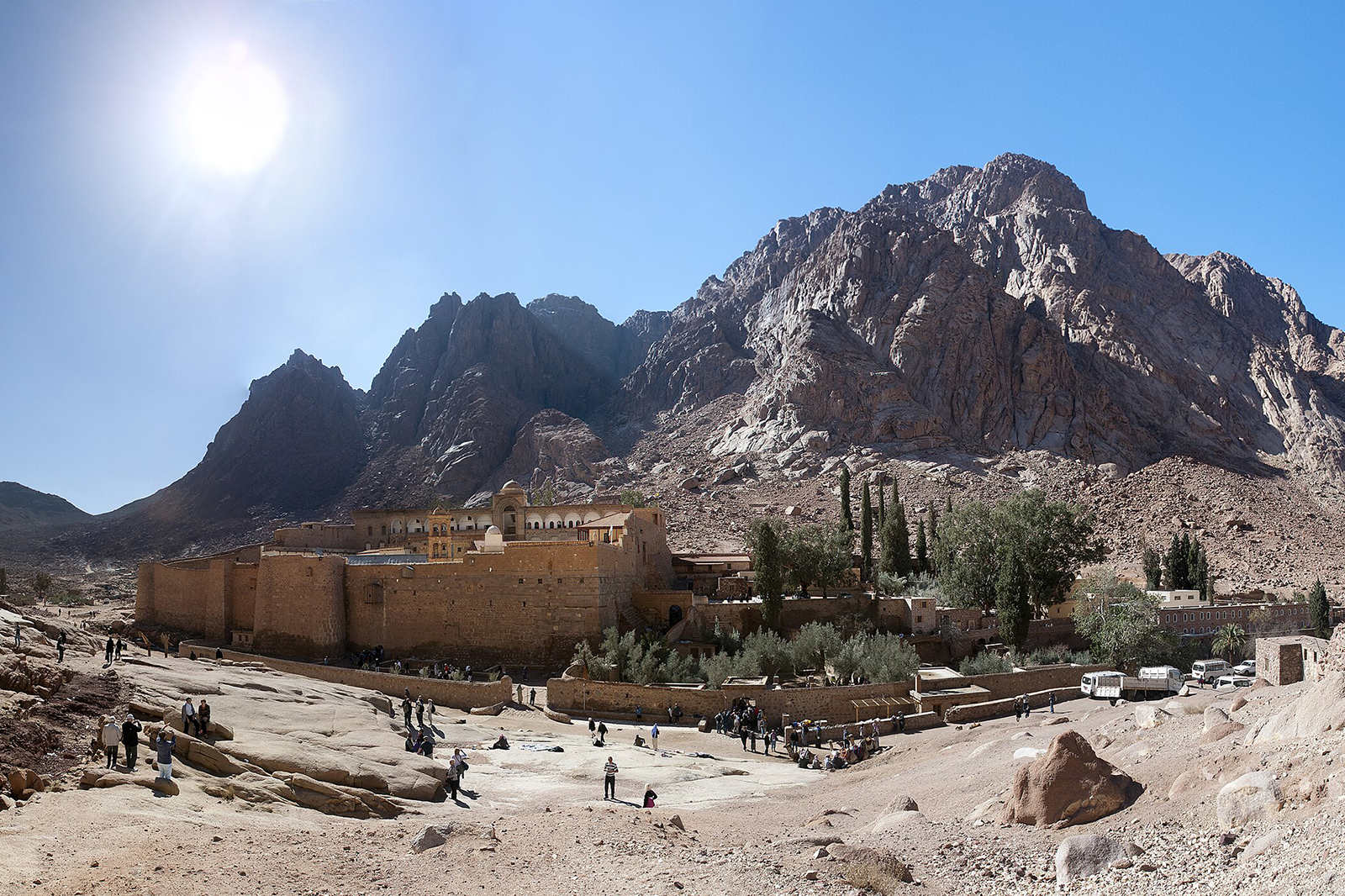
ISTANBUL (RNS) — As news filtered out of Egypt on Thursday (May 29) that a court ruling had called for nationalizing an ancient Orthodox Christian Monastery in the Sinai Desert and the eviction of its monks to make way for a museum, disbelief turned to outrage, from the Middle East to Greece, where politicians blasted the decision.
St. Catherine’s Monastery, which is inhabited by Greek Orthodox monks in Egypt, is considered to be the world’s oldest continuously operating Christian monastery. Established in the 6th century by order of Byzantine emperor Justinian I, St. Catherine’s lies at the foot of the mountain Christians identify as the biblical Mount Sinai and hosts a vast library that harbors priceless manuscripts and icons.
The monastery, whose right to function undisturbed is said to have been granted by the Prophet Muhammed, is a symbol of interfaith tolerance and Christian longevity in the Muslim world.
Egypt’s presidency has denied reports that the court ordered the monastery to be shuttered, noting that the ruling confirms the right of the monks to perform their religious duties at the monastery while also declaring its lands are now the property of the Egyptian state.
But the clarification came only after a flurry of statements from Christian leaders and Greek politicians.
Archbishop Ieronymos II of Athens and All Greece called the news “an act of violent infringement upon human and religious rights,” saying that “this spiritual lighthouse of Orthodoxy and Hellenism now faces a struggle for actual survival.”
The archbishop added, “I categorically condemn any attempt to alter the status that has prevailed in the region for 15 centuries and appeal to the Greek government and Prime Minister Mitsotakis to act decisively to restore legal order and prevent the abolition of the monastery.”
Greece’s foreign minister quickly demanded clarification from Egypt, noting that Egyptian President Abdel Fatah el-Sisi and Prime Minister of Greece Kyriakos Mitsotakis had discussed the status of the monastery during Sisi’s visit to Athens earlier in May.
“The Greek Prime Minister remains committed to the assurances he received,” said Pavlos Marinakis, a spokesperson for the Greek government. “We do not expect any deviation from the agreed terms.”
On Friday morning, Egypt’s presidential spokesperson said Sisi and Mitsotakis had spoken by phone on Friday morning. “The call stressed Egypt’s unwavering commitment to preserving the unique and sacred religious status of St. Catherine’s Monastery, ensuring this status remains untouched,” the Egyptian presidency said in a statement.
Nonetheless, a Greek state delegation is set to travel to Egypt on Monday to clarify the matter, Greek media reported.
Though the initial shock has largely been assuaged by the statements of Egyptian authorities, which confirmed there will be no evictions of the monks, the nationalization of St. Catherine’s lands is a major upheaval for a site whose legal ownership had never been clarified under modern Egyptian law. “What exists are scattered documents, gold bulls, decisions, correspondence, etc.,” Greek journalist Andreas Loudaros wrote in a commentary on the situation.

St. Catherine’s Monastery in the Sinai Desert, Egypt. (Photo by Joonas Plaan/Wikimedia/Creative Commons)
“The monks, who have been owners of the monastery since the 5th century, become guests in their home,” Archimandrite Porphyrios Fragkakos, the monastery’s spokesman, said on Greek TV Thursday. “All the monks will be able to do is operate, the rest belongs to the archaeological service.”
While the monastery’s vague legal status had been simply ignored for much of modern Egyptian history, it became a matter of debate again during the brief rule of the Muslim brotherhood over Egypt following the Arab Spring in 2012.
Sisi’s secularist government, which ousted and outlawed the brotherhood in 2014, has increasingly asserted its control over religious institutions in Egypt, both Muslim and Christian. In 2015 and later in 2021, local officials had brought the matter of the monastery’s ownership into the Egyptian courts, attempting to gain control over its lands.
That prompted the Greek government to negotiate an out-of-court solution directly with the Egyptian government, something many in Greece felt had been finalized by December and only lacked final signatures. The current ruling dynamites that agreement.
According to the monastery’s legal representative, Christos Kompiliris, the gardens around which the monks live were excluded from the ruling, but the surrounding agricultural lands that had for centuries sustained the monastery have all been transferred to the state.
“In other words, the monastery will be left essentially without property,” Kompiliris told Greek media.
Orthodox leaders beyond Egypt and Greece remain concerned that the monastery property’s changed status will interfere with the monks’ prayer and work. “The recent judicial actions which threaten to confiscate the monastery’s property and disrupt its spiritual mission are deeply troubling,” said Greek Orthodox Archbishop of America Elpidophoros.
“Such measures not only violate religious freedoms but also endanger a site of immense historical and cultural importance. It is imperative that the Egyptian government honors its previous commitments to protect the monastery’s autonomy and heritage,” the archbishop said.
In a statement on Friday, Ecumenical Patriarch of Constantinople Bartholomew I, first among equals among Eastern Orthodox patriarchs, appealed to Egypt to “find the appropriate way to maintain the status quo of the Holy Monastery, which has been particularly respected and has been preferentially secured for centuries by Islam, and to implement its recent agreement with the Monastery.”
In his own statement, the Greek Orthodox Patriarchate of Jerusalem, under whose jurisdiction the monastery falls, said on Friday, “We call on the Egyptian Authorities to follow this most esteemed tradition and ensure the freedom of worship and access to our monastery. Let our monastery continue this embodiment of peaceful Christian witness, education, and welcome.”
